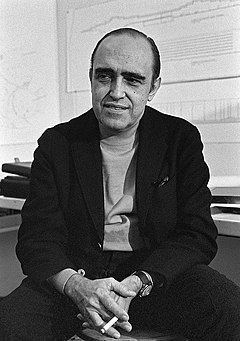Oscar Niemayer
| Oscar Niemeyer | |
|---|---|

Oscar Niemeyer in 1968
|
|
| Born |
Oscar Ribeiro de Almeida Niemeyer Soares Filho December 15, 1907 Rio de Janeiro, Brazil |
| Died | December 5, 2012 (aged 104) Rio de Janeiro, Brazil |
| Nationality | Brazil |
| Alma mater |
Escola Nacional de Belas Artes (1934) Federal University of Rio de Janeiro |
| Occupation | Architect |
| Awards |
|
| Buildings | |
| Projects | Museum of Modern Art in Caracas |
| Signature | |
Oscar Ribeiro de Almeida Niemeyer Soares Filho (December 15, 1907 – December 5, 2012)—known as Oscar Niemeyer (Brazilian Portuguese: [ˈɔʃkaʁ ˈnimajeʁ])—was a Brazilian architect considered to be one of the key figures in the development of modern architecture. Niemeyer was best known for his design of civic buildings for Brasília, a planned city that became Brazil's capital in 1960, as well as his collaboration with other architects on the headquarters of the United Nations in New York. His exploration of the aesthetic possibilities of reinforced concrete was highly influential in the late 20th and early 21st centuries.
Both lauded and criticized for being a "sculptor of monuments", Niemeyer was hailed as a great artist and one of the greatest architects of his generation by his supporters. He said his architecture was strongly influenced by Le Corbusier, but in an interview, assured that this "didn't prevent [his] architecture from going in a different direction". Niemeyer was most famous for his use of abstract forms and curves and wrote in his memoirs:
I am not attracted to straight angles or to the straight line, hard and inflexible, created by man. I am attracted to free-flowing, sensual curves. The curves that I find in the mountains of my country, in the sinuousness of its rivers, in the waves of the ocean, and on the body of the beloved woman. Curves make up the entire Universe, the curved Universe of Einstein.
Niemeyer was educated at the Escola Nacional de Belas Artes at the Federal University of Rio de Janeiro, and after graduating, he worked at his father's typography house and as a draftsman for local architectural firms. In the 1930s, he interned with Lúcio Costa, with the pair collaborating on the design for the Palácio Gustavo Capanema in Rio de Janeiro. Niemeyer's first major project was a series of buildings for Pampulha, a planned suburb north of Belo Horizonte. His work, especially on the Church of Saint Francis of Assisi, received critical acclaim and drew international attention. Throughout the 1940s and 1950s, Niemeyer became one of Brazil's most prolific architects, working both domestically and overseas. This included the design of the Edifício Copan (a large residential building in São Paulo) and a collaboration with Le Corbusier (and others) on the United Nations Headquarters, which yielded invitations to teach at Yale University and the Harvard Graduate School of Design.
...
Wikipedia
